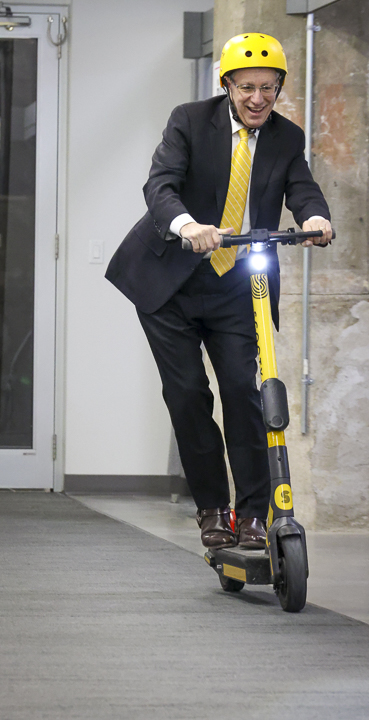Vic Fedeli got some hands-on experience with innovative transportation today as he glided through the Communitech Hub on a bright-yellow electric scooter.
“This is cool!” said the provincial Minister of Economic Development, Job Creation and Trade as he brought the snazzy machine to a stop in the Hub’s Innovation Concourse.
Fedeli visited the Communitech facility in downtown Kitchener to announce the renewal of a provincially supported program that helps tech founders accelerate the development and commercialization of autonomous vehicle and mobility technologies.
The partnership involves Communitech, the University of Waterloo and the Ontario government through the Ontario Vehicle Innovation Network (OVIN).
The joint initiative gives entrepreneurs access to resources that help them develop and commercialize the next generation of electric, connected and autonomous vehicles and related technologies.
The renewal of the three-year OVIN partnership follows a refreshed mandate for Ontario’s seven provincially supported regional technology development sites (RTDS), including Waterloo Region.
In addition to autonomous and connected-mobility technologies, the regional sites will also focus on the electrification of vehicle technology.
Communitech and UW are aligning their OVIN programming with Vision Zero, a global initiative that began in Sweden and aims to eliminate traffic fatalities and severe injuries. The collaboration reflects Communitech’s ongoing commitment to “tech for good.

Minister Vic Fedeli takes a spin on a Scooty scooter
at Communitech. (Communitech photo: Anthony Reinhart)
During his visit, Fedeli met with founders whose companies are engaged in robotics and innovative transportation. Which is how the minister came to be riding an electric scooter that, by coincidence, matched his bright yellow necktie.
The company that provided the machine is called Scooty. A Brampton-based startup, Scooty produces software for the scooter that enables digital payment on a per-ride basis via a phone app. The intent is to make the scooters an integrated part of public transit, enabling riders to easily connect with other forms of public transportation such as buses and trains.
“We’re connecting people to access public transit,” said co-founder Shoaib Ahmed. “If you get off the bus or the train, you can grab a Scooty vehicle and continue the last leg of your journey, or vice versa.”
A key focus is sustainability. By making it easy to use and pay for, the Scooty scooter has the potential to reduce the use of motor vehicles, said co-founder Shahid Pasha.
“We’re passionate about this because it is an energy reduction product,” he said. “It helps cities get to their net-zero targets.”
Fedeli also met with representatives from Ecopia AI, which uses satellite images to produce detailed HD maps that can assist in the development of autonomous-vehicle and mobility technologies. Ecopia provided its mapping platform and data to a forerunner of the OVIN program, and will be providing similar resources to the current version.
Another company on hand for the minister’s visit was OTTO Motors, a division of Kitchener-based Clearpath Robotics.
CTO and co-founder Ryan Gariepy described how the OTTO line of industrial robotics – a variety of forklift and product-carrying machines – can assist in a warehouse or manufacturing plant.
Gariepy, whose company participated in a previous autonomous-vehicle program at Communitech, praised such initiatives for helping founders develop and commercialize innovative new products.
When Fedeli asked him how the province could help companies like Clearpath, Gariepy emphasized the importance of having Ontario companies adopt Ontario-made innovation and work with startups to help improve their products.
Young companies need to iterate and improve their products quickly in real-life settings. That process is much easier if you have customers close to your home base, explained Gariepy.
Clearpath’s first two customers were in California and Washington State, which made for long, expensive trips from the company’s headquarters in Kitchener.
“Any startup needs to iterate quickly and cheaply,” said Gariepy. “You can imagine as a small startup the cost and time of flying your team and shipping your robots across international borders and across the continent… just endless airfares, and if your robot breaks, you need to ship it back.”
These days, Clearpath’s OTTO division has a relationship with nearby customer Toyota Motor Manufacturing Canada, which allows them to test and improve prototypes quickly.
“We’re fortunate enough that when we have a prototype, we can now test it at Toyota because they trust us,” Gariepy told Fedeli. “But the average startup just doesn’t have that choice. Anything that can encourage Ontario companies to adopt robotics, to invest in their physical plant for automation, is huge for us.”

